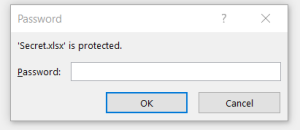Newsletter Archives
-
Encryption isn’t wise

View of password protected file
Before you think I’m about to say encryption in all cases isn’t wise, no, I’m not going to say that. But I will say there are times that encryption is a very bad idea if you’ve made no plans for someone else to know or how to handle getting back into a “thing” that is encrypted.
I can’t tell you how many times I’ve been asked how to remove an encryption password from an Excel file that someone used to store their passwords. The person may be ill or passed away, and their loved ones will be scrambling to get into various accounts. While there is software that can easily get into a QuickBooks file by removing the password and requiring you to reset it, for Excel it’s a slow, brute-force process to figure out what the password is. The best you can hope for is that there will be a favorite phrase on a sticky note somewhere. Otherwise, you may (probably will) be stuck trying to get into the accounts and recover access.
I am a fan of encryption when used responsibly. But when someone uses encryption and doesn’t plan on recovery, it can lead to a world of hurt. None of us will live forever. My dad is 96 and working on that, but he still makes sure I know how to get into his accounts or makes me an additional user on them.
It’s okay to write passwords down, hopefully in a safe place. It’s not okay to protect them so well that your loved ones can’t access them when they need to.
-
Technology fail! Hackers steal $870M from Zelle users, US says
PUBLIC DEFENDER

By Brian Livingston
Three of America’s largest banks — Bank of America, JPMorgan Chase, and Wells Fargo — were sued last month by the US Consumer Finance Protection Bureau (CFPB) for fraudulent losses suffered by their Zelle online-payment customers.
These banks and others launched Zelle in 2017 to compete with electronic funds-transfer apps like PayPal, Venmo, and Cash App. But the financial institutions failed to implement basic fraud-prevention measures, and as a result, Zelle customers have lost $870 million to hackers since the services began, the CFPB says.
Read the full story in our Plus Newsletter (22.02.0, 2025-01-13).
-
Let your PC start the new year right!
BEN’S WORKSHOP

By Ben Myers
Service your Windows PC thoroughly to get a big-time payoff in the coming year.
First, ask the question “How healthy is my hardware?” before considering what to do with any software. This reflects best practice, and it is exactly what happens here when a computer shows up at my shop in need of attention.
Messing around with the software on a computer with unhappy hardware can only worsen troubleshooting, analysis, and remediation. More importantly, it can change the content of a solid-state drive or hard drive in unpleasant ways.
Along the way, I’ll provide some guidelines for selecting or upgrading a system for using Windows 11, or even Windows 10 during its final year of unqualified support.
Read the full story in our Plus Newsletter (22.01.0, 2025-01-06).
-
You clicked on that phish?
ON SECURITY

By Susan Bradley
It happens. You fell for it. You clicked on something you shouldn’t have. You followed a link. You entered your password on a site that wasn’t legitimate.
In these instances, you didn’t suffer an intrusion to your computer. Instead, your login credentials were impacted. What should you do?
First, don’t panic. In the case of many attacks these days, your operating system is still intact — not impacted in any way. The once standard reaction “I got hacked, so I’ll restore my computer from a clean backup or reinstall from scratch” probably isn’t necessary. In fact, it may be irrelevant to your response.
Read the full story in our Plus Newsletter (21.46.0, 2024-11-11).
-
The US has banned Kaspersky software — should you worry?

ISSUE 21.42 • 2024-10-14 PUBLIC DEFENDER

By Brian Livingston
The popular Kaspersky antivirus program quietly disabled itself on computers in the US last month, making millions of users fear malware had struck them.
The switcheroo was prompted by the US government banning Kaspersky Lab, a Russia-based company, from sending updates to American devices after September 29, 2024. Kaspersky had sent out an email — which many users didn’t read or felt was unclear — before its app shut down on September 19. Kaspersky then remotely installed on US computers a little-known antivirus alternative called UltraAV.
Read the full story in our Plus Newsletter (21.42.0, 2024-10-14).
This story also appears in our public Newsletter. -
Why Proton means privacy
MICROSOFT 365

By Peter Deegan
If you want privacy in your email, cloud storage, and other parts of your digital life, then go to Proton’s suite of very secure but easy-to-use services.
Proton is a Swiss company with a suite of familiar services – email, cloud storage, VPN – but with an important difference: Proton is serious about privacy. Others, such as OneDrive and Dropbox, talk about privacy but aren’t so great in delivering it.
In this article, I’ll focus on the three important offerings of Proton and its free plans for private encrypted email, secure cloud storage, and properly private VPN.
Read the full story in our Plus Newsletter (21.41.0, 2024-10-07).
-
Redaction made easy for screen shots and PDFs
WINDOWS 11

By Peter Deegan
Both Windows and Mac have tools to remove (redact) details from screenshots and PDFs before sharing. As usual, there are some hidden traps that I’ll help you avoid.
My recent article on screenshots got a lot of forum comments, with some folks asking for more help with redaction tools. Given the slightest encouragement, I’m willing to dive in.
Read the full story in our Plus Newsletter (21.40.0, 2024-09-30).
-
How my Internet outage caused security problems
ON SECURITY

By Susan Bradley
I live in a city with electricity, high-speed Internet, and all the other customary modern conveniences.
In that same city dwell squirrels, birds (including beautiful hummingbirds), possums, kit foxes, bees, and too many others to mention. Although they’re lovely to have around, they are not necessarily the best of neighbors. Interaction with them doesn’t always work out, and sometimes that affects my technology — and even my security.
Read the full story in our Plus Newsletter (21.39.0, 2024-09-23).


